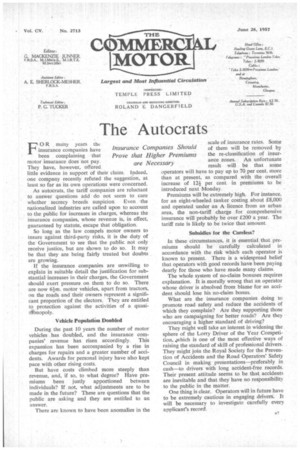The Autocrats
Page 41

If you've noticed an error in this article please click here to report it so we can fix it.
F0 R many years the insurance companies have been complaining that motor insurance does not pay. They have, however, offered little evidence in support of their claim. Indeed, one company recently refuted the suggestion, at least so far as its own operations were concerned.
As autocrats, the tariff companies are reluctant to answer questions add do not seem to care whether secrecy breeds suspicion. Even the nationalized industries are called upon to account to the public for increases in charges, whereas the insurance companies, whose revenue is, in effect, guaranteed by statute, escape that obligation.
So long as the law compels motor owners to insure against third-party risks, it is the duty of the Government to see that the public not only receive justice, but are shown to do so. It may be that they are being fairly treated but doubts are growing.
If the insurance companies are unwilling to explain in suitable detail the justification for substantial increases in their charges, the Government should exert pressure on them to do so. There are now 61m. motor vehicles, apart from tractors, on the roads and their owners represent a significant proportion of the electors. They are entitled to protection against the activities of a quasintonopoly.
Prove are
Vehicle Population Doubled During the past 10 years the number of motor vehicles has doubled, and the insurance companies' revenue has risen accordingly. This expansion has been accompanied by a rise in charges for repairs and a greater number of accidents. Awards for personal injury have also kept pace with other rising costs.
But have costs climbed more steeply than revenue, and, if so, to what degree? Have premiums been justly apportioned between individuals? If not, what adjustments are to be made in the future? These are questions that the public are asking and they are entitled to an answer.
There are known to have been anomalies in the scale of insurance rates. Some Companies Should of them will be removed by Necessary ance zones. An unfortunate that Higher Premiums the re-classification of insur
are
result will be that some operators will have to pay up to 70 per cent. more than at present, as compared with the overall increase of 14 per cent. in premiums to be introduced next Monday.
Premiums will be extremely high. For instance, for an eight-wheeled tanker costing about £8,000 and operated under an A licence from an urban area, the non-tariff charge for comprehensive insurance will probably be over E200 a year. The tariff rate is likely to betwice that amount. Subsidies for the Careless?
In these circumstances, it is essential that premiums should be carefully calculated in accordance with the risk which each operator is known to present. There is a widespread belief that operators with good records have been paying dearly for those who have made many claims.
The whole system of no-claim bonuses requires explanation. It is morally wrong that an operator whose driver is absolved from blame for an accident should lose his no-claim bonus.
What are the insurance companies doing to promote road safety and reduce the accidents of which they complain? Are they supporting those who are campaigning for better roads? Are they encouraging a higher standard of driving?
They might well take an interest in widening the sphere of the Lorry Driver of the Year Competition, ,which is one of the most effective ways of raising the standard of skill of professional drivers. They might join the Royal Society for the Prevention of Accidents and the Road Operators' Safety Council in making presentations—preferably in cash—to drivers with long accident-free records. Their present attitude seems to be that accidents are inevitable and that they have no responsibility to the public in the matter. to be extremely cautious in engaging drivers. It One thing is clear. Operators will in future have will be necessary to investigate carefully every applicant's record.








































































































































